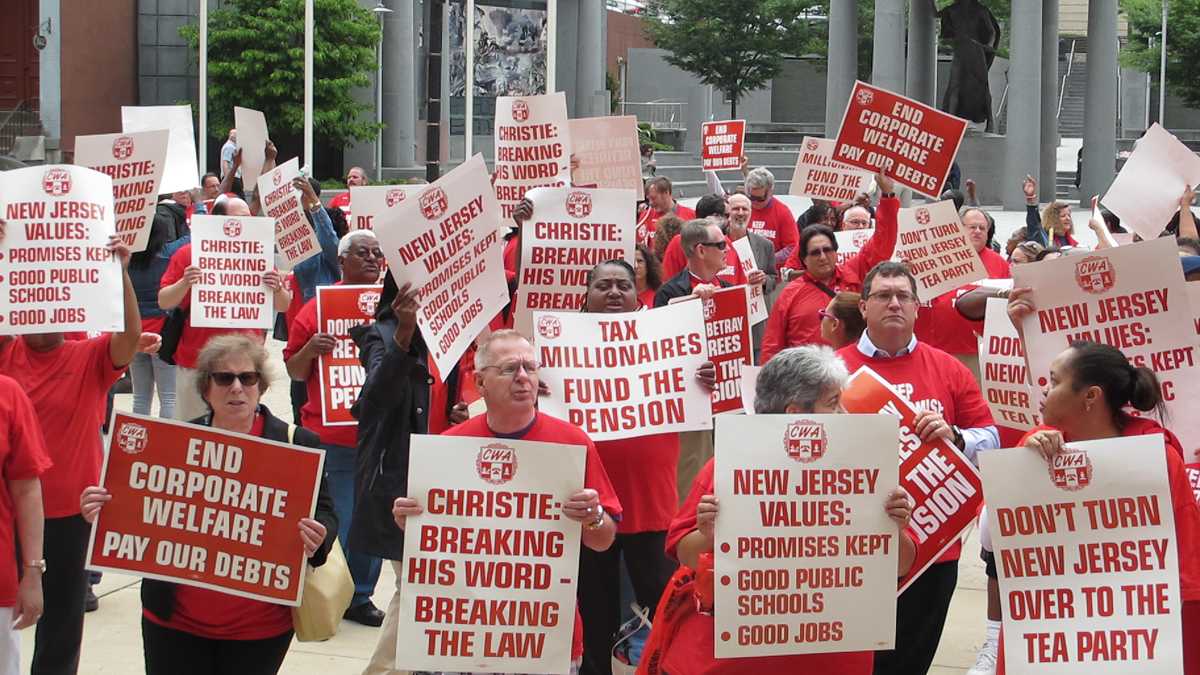NJ Supreme Court deals 2nd blow to public worker unions

Unionized public workers rally outside the New Jersey Statehouse (Phil Gregory/WHYY, file)
For the second time in a little more than a month the state Supreme Court has dealt a blow to public-worker unions in New Jersey, demonstrating the success Gov. Chris Christie has had in his efforts to reshape the court.
The high court, in a ruling issued yesterday, upheld actions that were taken to cut costs by three different municipal governments during the economic downturn in 2009. The cost-cutting measures, which were made outside of collective bargaining, include mandatory furloughs and demotions.
The employees’ unions argued such actions were tantamount to pay cuts and should have been subject to collective bargaining under the state Employer-Employee Relations Act, while the municipal governments portrayed them as necessary policy decisions taken in direct response to their economic woes.
The ruling yesterday comes in the wake of the court’s decision last month in a high-profile public-employee pension-funding case that also went against the unions. The majority in that case sided with the Christie administration’s position that it did not have to honor a series of state contributions to the chronically underfunded pension system. Ironically, the contributions were pledged as a contractual right of the employees in a 2011 benefits-reform law that was enacted by Christie.
Taken together, the two rulings demonstrate the impact that Christie, a second-term Republican now running for president, has had on the makeup of the state Supreme Court after more than five years in office. Though he reappointed Chief Justice Stuart Rabner, who was named to his post by former Democratic Gov. Jon Corzine, Christie also rejected the reappointment of another Democratic justice and successfully seated three Republicans — all while dealing with a Legislature controlled by Democrats.
The majority opinion issued yesterday was written by Justice Jaynee LaVecchia, an appointee of former Republican Gov. Christie Whitman. LaVecchia, who also wrote the majority opinion in the pension-funding case last month, was joined in yesterday’s majority by Christie nominees Anne Patterson and Lee Solomon, along with Judge Mary Catherine Cuff, an appellate judge temporarily filling a vacancy on the high court. The majority opinion largely upheld a 2013 Appellate Division ruling that also authorized the cost-savings actions that were taken by Belmar, Keyport, and Mount Laurel as their revenues plummeted in 2009 due to the economic downturn.
For Belmar and Mount Laurel, that meant forcing workers to accept unpaid furloughs, which were considered temporary layoffs. And Keyport reduced two of its employees from full-time to part-time, which affected their pay and health benefits.
“We cannot conclude that these matters required compelled negotiation,” LaVecchia wrote in the majority opinion. “These civil service municipalities, when faced with fiscal exigency, had the right to lay off employees under prior case law and as buttressed by the emergency regulation then in effect authorizing temporary layoff actions.”
The towns’ action were originally approved by the state Civil Service Commission, which had enacted temporary-furlough rules at the time, but then were rejected by the Public Employment Relations Commission, which determined the three towns didn’t work hard enough to find savings elsewhere. The towns in response appealed the employment commission’s decision to the state’s Appellate Division, which decided to consolidate the cases because they involved related legal questions.
Michael Darcy, executive director of the New Jersey League of Municipalities, which joined the case as a “friend of the court,” praised the decision, saying it upholds the towns’ prerogative to properly manage their finances.
“We appreciate the decision,” Darcy said. “Overall, we’re essentially quite happy.”
Rabner and Justice Faustino Fernandez-Vina did not participate in the decision, while Justice Barry Albin wrote a strong dissenting opinion that said the majority ruling “sweeps away nearly 50 years of this Court’s public-sector labor jurisprudence.”
“The majority’s endorsement of furloughs by fiat in non-emergent circumstances is a dismal sign for the future of public-sector collective negotiations,” Albin wrote.
Albin was also the author of the dissenting opinion issued in last month’s pension-funding case. While the majority in that case found that the state constitution allows only voters to authorize long-term obligations like the state-pension payments that were promised in the 2011 law, Albin argued that the U.S. Constitution protects contracts such as those between the workers’ unions and the state, and those federal protections supersede the state constitution.
Hetty Rosenstein, state director of the Communications Workers of America, which was a party in both Supreme Court cases, said yesterday’s ruling further deteriorates collective-bargaining rights for public workers in New Jersey.
“It’s a terrible ruling,” she said.
But Steven Weissman, one of the attorneys who argued the furlough case on behalf of labor, cautioned against viewing the ruling too broadly. That’s because it was rooted in the temporary civil-service regulation that has since expired, he said.
“The decision doesn’t have any meaningful impact on public-sector collective bargaining going forward,” Weissman said.
Christie, who recently joined the 2016 GOP presidential primary, has taken an aggressive stance with public workers and their unions since taking office in early 2010. And just last month his administration offered a new wrinkle, informing workers that incremental step increases in pay would no longer be honored for those subject to contracts that expired on June 30. At least one union has sued in response.
Christie during his tenure in the State House has also made changing the makeup of the Supreme Court a top priority, saying it had become too activist and that its decisions, including on issues like education funding and affordable housing, were crippling taxpayers with higher costs.
Instead of offering lifetime tenure to Justice John Wallace, a Democrat and the high court’s only African-American, he instead nominated Patterson, a Republican. That was the first time since the 1947 version of the state constitution was adopted that a sitting justice was not reappointed, and Christie’s decision set off a dispute over the makeup of the court with Democratic legislative leaders that has resulted in there still being a vacancy, the one currently being filled by Cuff.
Christie bragged about his work reshaping the court earlier this month during a Fox News Sunday interview, saying that the ruling in the pension-funding case was carried by three of his Republican justices.
“It’s a conservative decision and I’m proud of it and I’m proud of the people I appointed,” he said.
Christie’s office did not comment on yesterday’s Supreme Court ruling.
______________________________________________
NJ Spotlight, an independent online news service on issues critical to New Jersey, makes its in-depth reporting available to NewsWorks.
WHYY is your source for fact-based, in-depth journalism and information. As a nonprofit organization, we rely on financial support from readers like you. Please give today.




